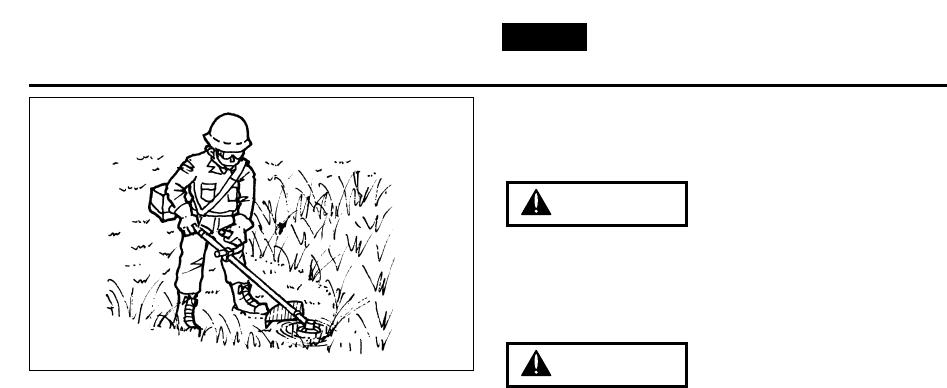
48
11. Optional blade usage
English
■ By using the shoulder strap, hang the unit on your
right side. Adjust the strap length so that the cutting
head may become parallel to the ground. (OPT11)
Make sure to use shoulder strap and debris guard.
If not, it is very dangerous when you slip or lose
your balance.
■ CONTROLLING BLADE THRUST
• Blade thrust can cause serious personal injury.
Carefully study this section. It is important that
you understand what causes blade thrust, how you
can reduce the chance of blade thrust and how you
can remain in control of the unit if blade thrust does
occur.
1. What causes blade thrust:
• Blade thrust can occur when the moving blade
contacts an object that it cannot cut. This contact
causes the blade to stop for an instant and then
suddenly move or ”bounce” away from the object
that was hit. The operator can lose control of the unit
and the blade can cause serious personal injury to
the operator or any person nearby if the blade
contacts any part of the body.
2.
How you can reduce the chance of blade thrust:
a. Recognize that blade thrust can happen. By
understanding and knowing about bounce, you
can help eliminate the element of surprise.
b. Cut fibrous weeds and grass only. Do not let
the blade contact materials it cannot cut such as
hard, woody vines and brush or rocks, fences,
metal, etc
c. Be extra prepared for blade thrust if you must cut
where you cannot see the blade making contact
such as in areas of dense growth.
d. Keep the blade sharp. A dull blade increase the
chance of blade thrust.
e. Avoid feeding the blade too rapidly. The blade
can bounce away from material being cut if the
blade is fed faster than its cutting capability.
f. Cut only from your right to your left.
g. Keep your path of advance clear of material that
has been cut and other debris.
WARNING
WARNING
OPT11


















